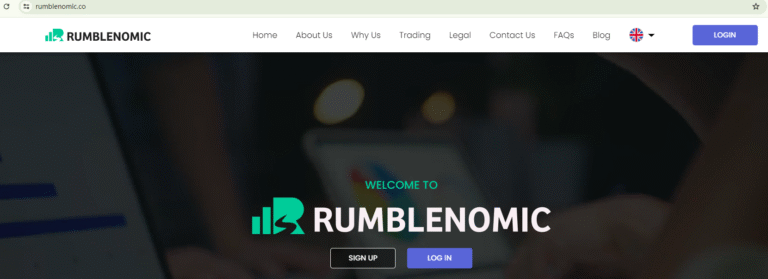Table of Contents
Introduction to Rumblenomic
This comprehensive Rumblenomic review examines the broker’s claims, services, and legitimacy. Rumblenomic presents itself as a trading platform offering access to Forex, crypto, and commodities, with its operations reportedly registered offshore. However, increasing complaints from users have raised concerns about a potential Rumblenomic scam.
Many investors ask the critical question: is Rumblenomic a scam or a reliable broker? This review is aimed at two groups — those who feel deceived by Rumblenomic and need answers, and those who are considering investing but want to confirm its authenticity. This Rumblenomic review uncovers all the warning signs you need to know.
Rumblenomic: Regulation & Legal Status
One of the most important factors in judging a broker’s credibility is regulation. Rumblenomic is reportedly registered in an offshore jurisdiction, but there is no evidence of regulation by reputable authorities such as the FCA (UK), ASIC (Australia), or CySEC (Cyprus). This absence of a valid license raises immediate red flags.
Many unregulated brokers use misleading references to respected financial watchdogs to create an illusion of legitimacy. Without real oversight, traders are left without investor protection, no access to independent dispute resolution, and no assurance of fund safety.
For your protection, learn how to spot a scam broker before it’s too late. The lack of transparency and oversight raises serious questions about whether Rumblenomic is a scam.
Trading Conditions & Platform Analysis of Rumblenomic
Rumblenomic offers multiple account types, but information about minimum deposits, spreads, and commissions is either vague or inconsistent. The broker promotes high leverage — often as high as 1:500 — which significantly increases risk for retail traders.
While Rumblenomic advertises a “professional trading platform,” there is no confirmation of the use of trusted platforms like MetaTrader 4 (MT4) or MetaTrader 5 (MT5). Additionally, there is no transparency regarding liquidity providers or proof of using STP/ECN execution, leaving serious concerns about trade fairness.
Before engaging, it’s critical to review what to check before signing up with a trading platform. These gaps make it difficult to dismiss the idea that Rumblenomic might be a fraud.
Reputation & User Reviews About Rumblenomic
Online Rumblenomic reviews show a troubling pattern. While some reviews seem overly positive (suggesting they may be fake), there are numerous complaints about withdrawal issues, frozen accounts, and poor customer service.
Traffic analysis on platforms like SimilarWeb indicates low engagement levels, which can be a sign of limited user trust or an unstable client base. On sites like Trustpilot, user feedback about Rumblenomic is mixed, but potential investors should be aware that many positive reviews could be fabricated.
How to Test Whether Rumblenomic Is a Scam
To determine whether Rumblenomic is a scam, take these steps:
- Verify regulation: Search databases of trusted regulators like FCA, ASIC, or CySEC. Missing or unverifiable licenses are a major red flag.
- Look for red flags: Watch out for unclear company information, hidden terms, or unrealistic promises of guaranteed returns.
- Research reviews: Read complaints on forums and platforms such as TrustPilot or Forex Peace Army to understand real user experiences.
- Test the website: Poor design, broken links, or non-functional features often indicate low-quality or fraudulent operations.
- Review withdrawal policies: Crypto-only payments and vague or restrictive withdrawal terms are common signs of scams.
- Try a demo account: Legitimate brokers usually provide a free demo account without requiring deposits.
Final Verdict & Alternatives
After reviewing Rumblenomic, we find several red flags: no credible regulation, vague trading conditions, and concerning user feedback. These issues make the platform highly risky for investors. If your goal is safety and reliability, avoiding Rumblenomic is a wise choice.
Instead, consider regulated brokers like IG, Pepperstone, or OANDA, which operate under strict oversight and provide a higher level of client protection. Always remember, trading with licensed brokers is the safest way to protect your investments.


